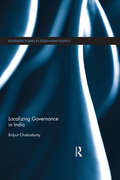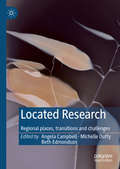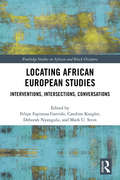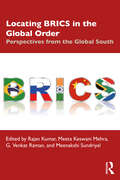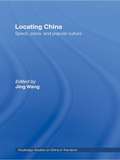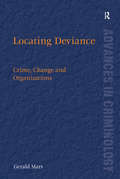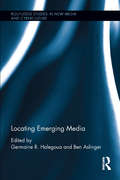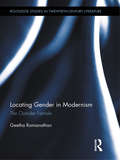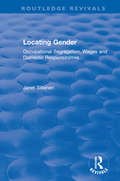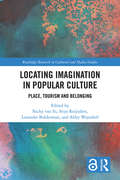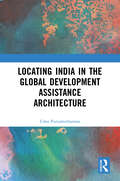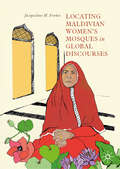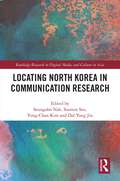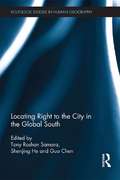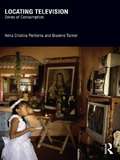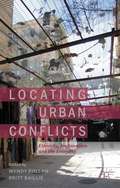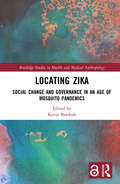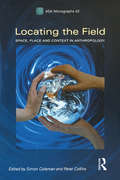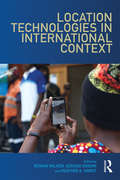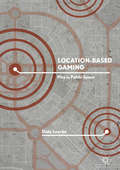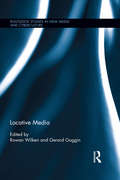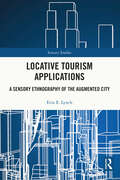- Table View
- List View
Localizing Governance in India (Routledge Studies in South Asian Politics)
by Bidyut ChakrabartyParticipatory governance has a long history in India and this book traces historical-intellectual trajectories of participatory governance and how older Western discourses have influenced Indian policymakers. While colonial rulers devolved power to accommodate dissenting voices, for independent India, participatory governance was a design for democratizing governance in its true sense. Participation also acted as a vehicle for localizing governance. The author draws on both Western and non-Western theoretical treatises and the book seeks to conceptualize localizing governance also as a contextual response. It also makes the argument that despite being located in different socio-economic and political milieu, thinkers converge to appreciate localizing governance as perhaps the only reliable means to democratize governance. The book aims to confirm this argument by reference to sets of evidence from the Indian experience of localizing governance. By attempting a genealogy of participatory governance in the West and in India, and an empirical study of participatory governance in India, the book sheds light on the exchange of ideas and concepts through space and time, thus adding to the growing body of literature in the social sciences on ‘conceptual flow’. It will be of interest to political scientists and historians, in particularly those studying South Asia.
Locally Brewed
by Anna BlessingLocally Brewed celebrates the Midwest's craft brewing movement with profiles of 20 of the area's brewmasters and their breweries. These are entertaining and inspiring stories of the individuals who have been essential in the exponential growth of this movement, as told through vivid interviews, beautiful photography, and dynamic artwork.In just the past 20 years, beer has been transformed from a "low-class" drink to a pluralistic, populist drink with the same stylistic diversity and caring craftsmanship as wine. One of the strongest hotbeds of this cultural shift is in the Midwest, where independently owned craft brewers focus on the creative, artisanal elements of the beer-making process. Locally Brewed explores these trends and the fun, fascinating, and unique details of each brewery, including label art, hand-pull designs, and of course the brews themselves.This is a book that can be enjoyed by the "beer geek" and the casual imbiber alike, as it emphasizes the people behind the beer as well as the beers they brew. Special sidebars and pullouts show what makes each brewery special, weaving together the story of the indie beer movement, relevant to both small-town Midwesterners and big-city beer lovers.
Locally Laid: How We Built a Plucky, Industry-changing Egg Farm - from Scratch
by Lucie B. AmundsenHow a Midwestern family with no agriculture experience went from a few backyard chickens to a full-fledged farm--and discovered why local chicks are better.When Lucie Amundsen had a rare night out with her husband, she never imagined what he'd tell her over dinner--that his dream was to quit his office job (with benefits!) and start a commercial-scale pasture-raised egg farm. His entire agricultural experience consisted of raising five backyard hens, none of whom had yet laid a single egg. To create this pastured poultry ranch, the couple scrambles to acquire nearly two thousand chickens--all named Lola. These hens, purchased commercially, arrive bereft of basic chicken-y instincts, such as the evening urge to roost. The newbie farmers also deal with their own shortcomings, making for a failed inspection and intense struggles to keep livestock alive (much less laying) during a brutal winter. But with a heavy dose of humor, they learn to negotiate the highly stressed no-man's-land known as Middle Agriculture. Amundsen sees firsthand how these midsized farms, situated between small-scale operations and mammoth factory farms, are vital to rebuilding America's local food system. With an unexpected passion for this dubious enterprise, Amundsen shares a messy, wry, and entirely educational story of the unforeseen payoffs (and frequent pitfalls) of one couple's ag adventure--and many, many hours spent wrangling chickens.
Located Research: Regional places, transitions and challenges
by Angela Campbell Beth Edmondson Michelle DuffyThis book examines the diversity of practice in regional research and its contribution to local, national and global issues. Three themes are advanced here: Place and change, Transition and resilience, and Challenges for the future. Contributors embrace frameworks of co-design and transdisciplinary practice to build communities of practice in response to lived experience in regional contexts. Their work highlights the strategic importance of a regional focus at a time when global connectivity and mobility is increasing and the complexity of ‘wicked’ problems demands more than one approach or solution. Such complex problems require nuanced, and at times ‘bespoke’ methodological approaches to better understand and support not just regional adaptation, resilience and transformation, but to manage all these things at a time when change is everywhere.
Locating African European Studies: Interventions, Intersections, Conversations (Routledge Studies on African and Black Diaspora)
by Caroline Koegler Felipe Espinoza Garrido Deborah Nyangulu Mark U. SteinDrawing on a rich lineage of anti-discriminatory scholarship, art, and activism, Locating African European Studies engages with contemporary and historical African European formations, positionalities, politics, and cultural productions in Europe. Locating African European Studies reflects on the meanings, objectives, and contours of this field. Twenty-six activists, academics, and artists cover a wide range of topics, engaging with processes of affiliation, discrimination, and resistance. They negotiate the methodological foundations of the field, explore different meanings and politics of ‘African’ and ‘European’, and investigate African European representations in literature, film, photography, art, and other media. In three thematic sections, the book focusses on: African European social and historical formations African European cultural production Decolonial academic practice Locating African European Studies features innovative transdisciplinary research, and will be of interest to students and scholars of various fields, including Black Studies, Critical Whiteness Studies, African American Studies, Diaspora Studies, Postcolonial Studies, African Studies, History, and Social Sciences.
Locating BRICS in the Global Order: Perspectives from the Global South
by Rajan Kumar Meeta Keswani Mehra G. Venkat Raman Meenakshi SundriyalBRICS is conceivably the most formidable organisation to have emerged in the post-Cold War period in the non-Western world. This book highlights the significance of BRICS in a wider global context and foregrounds the long-pending demand for the reform of global governance institutions. The volume: • Traces how the organisation came into being and looks at the distinct norms and principles espoused by it • Discusses the glaring limitations of the existing institutions of global governance • Explores the economic growth and the rising political influence of BRICS states • Analyses the internal threats to the survival of the organisation and assesses its prospects in the foreseeable future. A significant intervention in situating BRICS as one of the major players in global governance, the book will be of great interest to students and scholars of international political economy, international business and finance, international relations, politics, and Global South Studies.
Locating China: Space, Place, and Popular Culture (Routledge Studies on China in Transition #2)
by Jing WangTaking a multidisciplinary approach, this volume examines the relationship between space and the production of local popular culture in contemporary China. The international team of contributors examine the inter-relationship between the cultural imaginary of a given place and China’s continuing drive towards urbanization. This has led to the development of new spaces and places, and new forms of spatial practices that destabilize old concepts of the ‘local’ and ‘locality’. Delivering ethnographic observations and theoretical speculations, this work furthers our understanding of the link between spatial thinking and the production of consumer culture in China.
Locating Deviance: Crime, Change and Organizations (New Advances in Crime and Social Harm)
by Gerald MarsThis book takes a radical look at organizational crime and deviance through the prism of Cultural Theory derived from anthropology. It does so through case studies and by introducing new concepts such as 'organizational perversion', 'tyranny' and 'organizational capture'. Exploring the effects of change and environmental influences such as globalization, new technologies and trade-cycles on the nature and potency of criminogenic communities such as ports and holiday resorts, the book gives special attention to the justification of ethics and to the analysis of behaviours that have contributed to the current economic downturn. The Appendix offers a practical guide to the ethnographic assessment of links between organizations and varying types of crime and deviancy using a Cultural Theory framework.
Locating Emerging Media (Routledge Studies in New Media and Cyberculture)
by Ben Aslinger Germaine R. HalegouaLocating Emerging Media focuses on the tensions between the local and global in the design, distribution, and use of emerging media forms, building on scholarship on the cultural geography of new media networks and products and the relationships between the "global" and the "local." Authors consider new media practices, texts, services, software, policies, infrastructures, and design discourses that enrich existing relationships between creative industries and cultures of production, reception, and engagement. This consideration highlights the relationships between global and local perspectives and new media technologies and practices emerging within (and through) the geography and culture of particular places. Areas examined include East Asia, Latin America, Africa, Europe, South Asia, the Pacific Islands, and the Middle East. Through all is the recognition that what is new or emergent around the globe is unique in each locality.
Locating Gender in Modernism: The Outsider Female (Routledge Studies in Twentieth-Century Literature)
by Geetha RamanathanThis book visits modernism within a comparative, gendered, and third-world framework, questioning current scholarly categorisations of modernism and reframing our conception of what constitutes modernist aesthetics. It describes the construction of modernist studies and argues that despite a range of interventions which suggest that philosophical and material articulations with the third world shaped modernism, an emphasis on modernist "universals" persists. Ramanathan argues that women and third-world authors have reshaped received notions of the modern and revised orthodox ideas on the modern aesthetic. Authors such as Bessie Head, Josiane Racine, T.Obinkaram Echewa, Raja Rao, Gabriel Garcia Marquez, Sembene Ousmane, Salman Rushdie, Ana Castillo, Attia Hossain, Bapsi Sidhwa, and Sahar Khalifeh, are visited in their specific cultural contexts and use some form of realism, a mode that western modernism relegates to the nineteenth century. A comparative methodology and extensive research on intersecting topics such as post-coloniality and the articulation between gender and modernist aesthetics facilitates readings of the modern in twentieth century literature that fall outside standards of western modernism. Considering the relationship between aesthetics and ideology, Ramanathan lays out a critical apparatus to enhance our understanding of the modern, thus suggesting that form is not universal, but that the history of forms, like the history of colonialism and of women, indicates very specific modalities of the modern.
Locating Gender: Occupational Segregation, Wages and Domestic Responsibilities
by Janet SiltanenFirst published in 1994, Locating Gender combines a case-study approach with significant theoretical development to challenge explanations of occupational segregation. It examines the diversity of women’s employment experience, gender segregation within employment establishments, employment and domestic relations, and the place of gender in perceptions of inequality. The book develops the concepts of component-wage and full-wage jobs in the context of work histories and employment relations, and establishes their usefulness in the study of the social adequacy of wages. In doing so, it provides a close and critical examination of the power of gender as an explanatory concept in employment and domestic relations, including an in-depth analysis of the circumstances prior to, and following, changes to eliminate sex discrimination from official practices in a particular workplace. It will be of interest to students and researchers of gender studies, the sociology of work and social stratification, social policy, business studies, and labour economics.
Locating Heisei in Japanese Fiction and Film: The Historical Imagination of the Lost Decades (Routledge Contemporary Japan Series)
by Marc YamadaThis book provides the first interdisciplinary examination of the popular fiction and film of the “lost decades” of Japan’s Heisei period (1989–2019). Presenting original analysis of major Heisei writers, filmmakers, and manga artists, the chapters examine the work of Urasawa Naoki, Kurosawa Kiyoshi, Murakami Haruki, and Shinkai Makoto, among others. Through the work of these cultural figures, the book also explores the struggle to define the history of Heisei—three decades of economic stagnation, social malaise, and natural disaster. In particular, it explores the dissonance between the dominant history of Japan’s recent past and the representation of this past in the popular imagination of the period. In so doing, this book argues that traumatic events from the years leading up to Heisei complicate the narration of a cohesive sense of history for the period, requiring works of fiction and film to explore new connections to the past. Incorporating literary and film theory to assess the works of culture, Locating Heisei in Japanese Fiction and Film will be useful to students and scholars of Japanese culture, society, and history.
Locating Imagination in Popular Culture: Place, Tourism and Belonging (Routledge Research in Cultural and Media Studies)
by Nicky van Es; Stijn Reijnders; Leonieke Bolderman; Abby WaysdorfLocating Imagination in Popular Culture offers a multi-disciplinary account of the ways in which popular culture, tourism and notions of place intertwine in an environment characterized by ongoing processes of globalization, digitization and an increasingly ubiquitous nature of multi-media. Centred around the concept of imagination, the authors demonstrate how popular culture and media are becoming increasingly important in the ways in which places and localities are imagined, and how they also subsequently stimulate a desire to visit the actual places in which people’s favourite stories are set. With examples drawn from around the globe, the book offers a unique study of the role of narratives conveyed through media in stimulating and reflecting desire in tourism. This book will have appeal in a wide variety of academic disciplines, ranging from media and cultural studies to fan- and tourism studies, cultural geography, literary studies and cultural sociology.
Locating India in the Global Development Assistance Architecture
by Uma PurushothamanThis book explores the intricate web of global development assistance, dissecting India’s unique position within this dynamic landscape, to study the country’s evolving role in International Development. The subject matter traces India’s trajectory from its early years as a recipient of foreign aid to its emergence as a key player in providing assistance to other nations. It also examines the motivations and challenges that shape India’s engagement in the global development arena.Presenting a detailed analysis of India’s responsibilities, aspirations, and the evolving nature of global aid, this book is aimed at scholars, policymakers, and anyone seeking a broad understanding of India’s role in shaping the global development narrative.Print edition not for sale in South Asia (India, Sri Lanka, Nepal, Bangladesh, Pakistan and Bhutan)
Locating Maldivian Women’s Mosques in Global Discourses
by Jacqueline H. FewkesIn this ethnographic examination of women’s mosques in the Maldives, anthropologist Jacqueline H. Fewkes probes how the existence of these separate buildings—where women lead prayers for other women—intersect with larger questions about gender, space, and global Muslim communities. Bringing together ethnographic insight with historical accounts, this volume develops an understanding of the particular religious and cultural trends in the Maldives that have given rise to these unique socio-religious institutions. As Fewkes considers women’s spaces in the Maldives as a practice apart from contemporary global Islamic customs, she interrogates the intersections between local, national, and transnational communities in the development of Islamic spaces, linking together the role of nations in the formation of Muslim social spaces with transnational conceptualizations of Islamic gendered spaces. Using the Maldivian women’s mosque as a starting point, this book addresses the roles of both the nation and the global Muslim ummah in locating gendered spaces within discourses about gender and Islam.
Locating North Korea in Communication Research (Routledge Research in Digital Media and Culture in Asia)
by Dal Yong Jin Seungahn Nah Yong-Chan Kim Soomin SeoThis volume showcases continuity and change in communication with and within North Korea. By approaching the country from three distinct angles – news media, popular culture, and digital technology – this volume looks at media portrayals of North Korea, at cultural discourses in various media, and at the impact of new and emerging technologies.Taking a variety of communication studies perspectives, this book first addresses why North Korea matters for the general audience, academic audience, and communication scholars in particular, and how communication studies can benefit from studying North Korea. Drawing on insights from history and international relations, this book shows how the Cold War and Old-World Order shape media and communications in places like North Korea, as well as how the desire for people to communicate and to be understood can surpass such a regime’s tight control.This multifaceted look at communication within this fascinating and under-studied nation will appeal to scholars, researchers, and upper-level students of communication studies, media studies, journalism, new and digital media, and political communication.
Locating Right to the City in the Global South (Routledge Studies in Human Geography)
by Shenjing He Tony Roshan Samara Guo ChenDespite the fact that virtually all urban growth is occurring, and will continue to occur, in the cities of the Global South, the conceptual tools used to study cities are distilled disproportionately from research on the highly developed cities of the Global North. With urban inequality widely recognized as central to many of the most pressing challenges facing the world, there is a need for a deeper understanding of cities of the South on their own terms. Locating Right to the City in the Global South marks an innovative and far reaching effort to document and make sense of urban transformations across a range of cities, as well as the conflicts and struggles for social justice these are generating. The volume contains empirically rich, theoretically informed case studies focused on the social, spatial, and political dimensions of urban inequality in the Global South. Drawing from scholars with extensive fieldwork experience, this volume covers sixteen cities in fourteen countries across a belt stretching from Latin America, to Africa and the Middle East, and into Asia. Central to what binds these cities are deeply rooted, complex, and dynamic processes of social and spatial division that are being actively reproduced. These cities are not so much fracturing as they are being divided by governance practices informed by local histories and political contestation, and refracted through or infused by market based approaches to urban development. Through a close examination of these practices and resistance to them, this volume provides perspectives on neoliberalism and right to the city that advance our understanding of urbanism in the Global South. In mapping the relationships between space, politics and populations, the volume draws attention to variations shaped by local circumstances, while simultaneously elaborating a distinctive transnational Southern urbanism. It provides indepth research on a range of practical and policy oriented issues, from housing and slum redevelopment to building democratic cities that include participation by lower income and other marginal groups. It will be of interest to students and practitioners alike studying Urban Studies, Globalization, and Development.
Locating Television: Zones of Consumption
by Graeme Turner Anna Cristina PertierraLocating Television: Zones of Consumption takes an important next step for television studies: it acknowledges the growing diversity of the international experience of television today in order to address the question of ‘what is television now?’ The book addresses this question in two interrelated ways: by situating the consumption of television within the full range of structures, patterns and practices of everyday life; and by retrieving the importance of location as fundamental to these structures, patterns and practices – and, consequently, to the experience of television. This approach, involving collaboration between authors from cultural studies and cultural anthropology, offers new ways of studying the consumption of television – in particular, the use of the notion of ‘zones of consumption’ as a new means of locating television within the full range of its spatial, temporal, cultural, political and industrial contexts. Although the study draws its examples from a wide range of locations (the US, the UK, Australia, Malaysia, Cuba, and the Chinese language markets in Asia - -Hong Kong, Singapore, China and Taiwan), its argument is strongly informed by the evidence and the insights which emerged from ethnographic research in Mexico. This research site serves a strategic purpose: by working on a location with a highly developed and commercially successful transnational television industry, but which is not among the locations usually considered by television studies written in English, the limitations to some of the assumptions underlying the orthodoxies in Anglo-American television studies are highlighted. Suitable for both upper level students and researchers, this book is a valuable and original contribution to television, media and cultural studies, and anthropology, presenting approaches and evidence that are new to the field.
Locating Urban Conflicts
by Wendy Pullan Britt BaillieCities have emerged as the epicentres for many of today's ethno-national and religious conflicts. This book brings together key themes that dominate our current attention including emerging areas of contestation in rapidly changing and modernising cities and the effects of extreme and/or enduring conflicts upon ordinary civilian life.
Locating Zika: Social Change and Governance in an Age of Mosquito Pandemics (Routledge Studies in Health and Medical Anthropology)
by Kevin BardoshThe emergence of Zika virus in 2015 challenged conventional ideas of mosquito-borne diseases, tested the resilience of health systems and embedded itself within local sociocultural worlds, with major implications for environmental, sexual, reproductive and paediatric health. This book explores this complex viral epidemic and situates it within its broader social, epidemiological and historical context in Latin America and the Caribbean. The chapters include a diverse set of case studies from scholars and health practitioners working across the region, from Brazil, Venezuela, Ecuador, Mexico, Colombia, the United States and Haiti. The book explores how mosquito-borne disease epidemics (not only Zika but also chikungunya, dengue and malaria) intersect with social change and health governance. By doing so, the authors reflect on the ways in which situated knowledge and social science approaches can contribute to more effective health policy and practice for mosquito-borne disease threats in a changing world.
Locating the Field: Space, Place and Context in Anthropology (ASA Monographs #42)
by Simon Coleman; Peter CollinsAre reports of the death of conventional fieldwork in anthropology greatly exaggerated? This book takes a critical look at the latest developments and key issues in fieldwork. The nature of 'locality' itself is problematic for both research subjects and fieldworkers, on the grounds that it must now be maintained and represented in relation to widening (and fragmenting) social frames and networks. Such developments have raised questions concerning the nature of ethnographic presence and scales of comparison. From the social space of a cybercafe to cities in India, the UK and South Africa among others, this book features a wide range of ethnographic studies that provide new ways of looking at the concepts of 'locality' and 'site'. It shows that rather than taking key fieldwork processes such as globalization and mobility for granted, anthropologists are well-placed to examine and critique the totalizing assumptions behind these notions.
Location Technologies in International Context (Internationalizing Media Studies)
by Gerard Goggin Heather A. Horst Rowan WilkenLocation Technologies in International Context offers the first international account of location technologies (in an expanded sense) and brings together a range of contributions on these technologies and their various cultures of use within the Global South. This collection asks: How, within the Global South, do location technologies differ across national markets, geo-linguistic communities and cultural contexts? What are the contrasting or shared meanings and practices associated with location technologies? And what innovative practices and new (or reinvigorated) theory may emerge from attention to the Global South? In exploring these questions, the collection contributes to our understanding of social, cultural, gendered and political relations on a global and local scale. Location Technologies in International Context is ideal for a range of disciplines, including cultural, communication and media studies; anthropology, sociology and geography; new media, Internet and mobile studies; and informatics and development studies.
Location-Based Gaming: Play in Public Space
by Dale LeorkeLocation-based games emerged in the early 2000s following the commercialisation of GPS and artistic experimentation with ‘locative media’ technologies. Location-based games are played in everyday public spaces using GPS and networked, mobile technologies to track their players’ location. This book traces the evolution of location-based gaming, from its emergence as a marginal practice to its recent popularisation through smartphone apps like Pokémon Go and its incorporation into ‘smart city’ strategies. Drawing on this history and an analysis of the scholarly and mainstream literature on location-based games, Leorke unpacks the key claims made about them. These claims position location-based games as alternately enriching or diminishing their players’ engagement with the people and places they encounter through the game. Through rich case studies and interviews with location-based game designers and players, Leorke tests out and challenges these celebratory and pessimistic discourses. He argues for a more grounded approach to researching location-based games and their impact on public space that reflects the ideologies, lived experiences, and institutional imperatives that circulate around their design and performance. By situating location-based games within broader debates about the role of play and digitisation in public life, Location-Based Gaming offers an original and timely account of location-based gaming and its growing prominence.
Locative Media (Routledge Studies in New Media and Cyberculture)
by Gerard Goggin Rowan WilkenNot only is locative media one of the fastest growing areas in digital technology, but questions of location and location-awareness are increasingly central to our contemporary engagements with online and mobile media, and indeed media and culture generally. This volume is a comprehensive account of the various location-based technologies, services, applications, and cultures, as media, with an aim to identify, inventory, explore, and critique their cultural, economic, political, social, and policy dimensions internationally. In particular, the collection is organized around the perception that the growth of locative media gives rise to a number of crucial questions concerning the areas of culture, economy, and policy.
Locative Tourism Applications: A Sensory Ethnography of the Augmented City (Sensory Studies)
by Erin E. LynchTravel through time. Walk the streets as they were. See through floors. Hunt for ghosts (with drink in hand). Hear the walls speak. These are just a few of the ways that locative tourism applications seek to augment the urban experience. This book explores the universe of locative tourism applications. It uses multi-sited sensory ethnography with diverse apps in twelve cities around the world to interrogate how these applications layer (often branded) maps of meaning over the urban environment, and exposes what their use – at the embodied intersection of physical and digital space – can tell us about the production of cityscapes for touristic consumption. Locative Tourism Applications takes a journey in three parts to evaluate how these ‘extensions of the senses’ mediate users’ experience of urban locales. The first offers the reader some theoretical and methodological orientation, the second takes them on a whirlwind tour of locative apps, and the third settles in for an extended exploration of two destinations: Montreal and Christchurch. With broad cross-disciplinary appeal, this volume will be of interest to scholars from tourism studies, cultural geography, urban studies, new media studies and sensory studies and particularly valuable for sensory ethnographers examining mobile and location-aware media.
